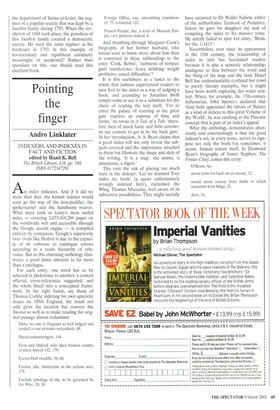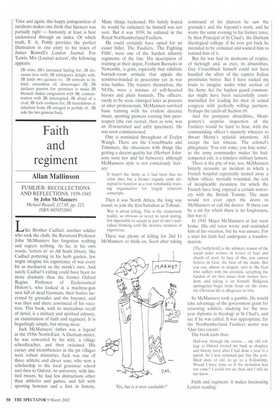Pointing the finger
Andro Linklater
INDEXERS AND INDEXES IN FACT AND FICTION edited by Hazel K. Bell The British Library, £16, pp. 160, ISBN 0172347291 An index indicates. And if it did no more than that, the human indexer would soon go the way of the iron-puddler, the spoke-turner and the handloom weaver. What must rank as today's most useful index — covering 2,073,418,204 pages on the worldwide web and accessible through the Google search engine — is compiled entirely by computers. Google's superiority over rivals like Hotbot is due to the capacity of its software to catalogue entries according to a crude hierarchy of relevance. But as this charming anthology illustrates, a good index amounts to far more than a catalogue.
For each entry, one word has to be selected in preference to another, a context offered, cross-references suggested, and the whole fitted into a conceptual framework. In the right hands, say those of Thomas Carlyle indexing his own splenetic essays on 1850s England, the result not only gives the location but conveys the flavour so well as to make reading the original passage almost redundant:
Foreign Office, our. astonishing conditions of, 75, reformed, 122.
French People, the, a kind of Messiah People, very glorious indeed, 4.
And thumbing through Margaret Cook's biography of her former husband, who would want to know more about him than is contained in these subheadings to the entry 'Cook, Robin', 'outbursts of temper; guilt transference; heavy drinking; weight problems; sexual difficulties'?
It is this usefulness as a taster to the whole that induces experienced readers to turn first to the index as a way of judging a book, and according to Jonathan Swift tempts some to use it as a substitute for the chore of reading the text itself. Tor to enter the palace of learning at the great gate requires an expense of time and forms,' he wrote in A Tale of a Tub, 'therefore men of much haste and little ceremony are content to get in by the back gate,' In her introduction, A. S. Byatt claims that a good index will not only reveal the subjects covered and the importance attached to them but illustrate the shape and style of the writing. 'It is a map,' she insists, 'a mnemonic, a digest.'
This runs the risk of placing too much trust in the indexer. 'Let no damned Tory index my book! (a quote unfortunately wrongly indexed here), exclaimed the Whig, Thomas Macaulay, well aware of its subversive possibilities. They might usefully
have occurred to Dr Waldo Nelson, editor of the authoritative Textbook of Pediatrics, before he gave his daughter the task of compiling the index to his massive tome. He utterly failed to spot her entry, 'Birds, for the, 1-1413.'
Nevertheless, ever since its appearance in the 15th century, the relationship of index to text has fascinated readers because it is also a semiotic relationship, analagous to that between the word and the thing or the map and the land. Hazel Bell has understandably confined her trawl to purely literary examples, but it might have been worth exploring this wider context. When, for example, the 17th-century millenarian, John Spencer, declared that 'God hath appointed the labors of Nature as a kind of indices to this great Volume of the World', he was catching at the Platonic concept that is part of an index's appeal.
What the anthology demonstrates abundantly and entertainingly is that the good indexer's wit, in every sense, serves to signpost not only the book but sometimes, it seems, human nature itself. In Desmond Ryan's biography of James Stephen, The Fenian Chief, comes this entry:
O'Brien, An: never turns his back on an enemy, 32.
would never retreat from fields in which ancestors were kings, 33.
does, 34.
Time and again, this happy juxtaposition of incidents makes one think that Spencer was partially right — humanity at least is best understood through an index. Of which truth, F. A. Pottle provides the perfect illustration in one entry to his index of James Boswell's London Journal. For 'Lewis, Mrs (Louisa) actress', the following appears:
JB visits; JB's increased feeling for; JB discusses love with; JB anticipates delight with; JB lends two guineas to; JB entreats to be kind; uneasiness of; discourages 3B; 313 declares passion for; promises to make JB blessed; makes assignation with JB: consummation with JB interrupted; JB afraid of a rival; JB feels coolness for; JB incredulous at infection from; JB enraged at perfidy of; JB asks his two guineas back.















































































 Previous page
Previous page